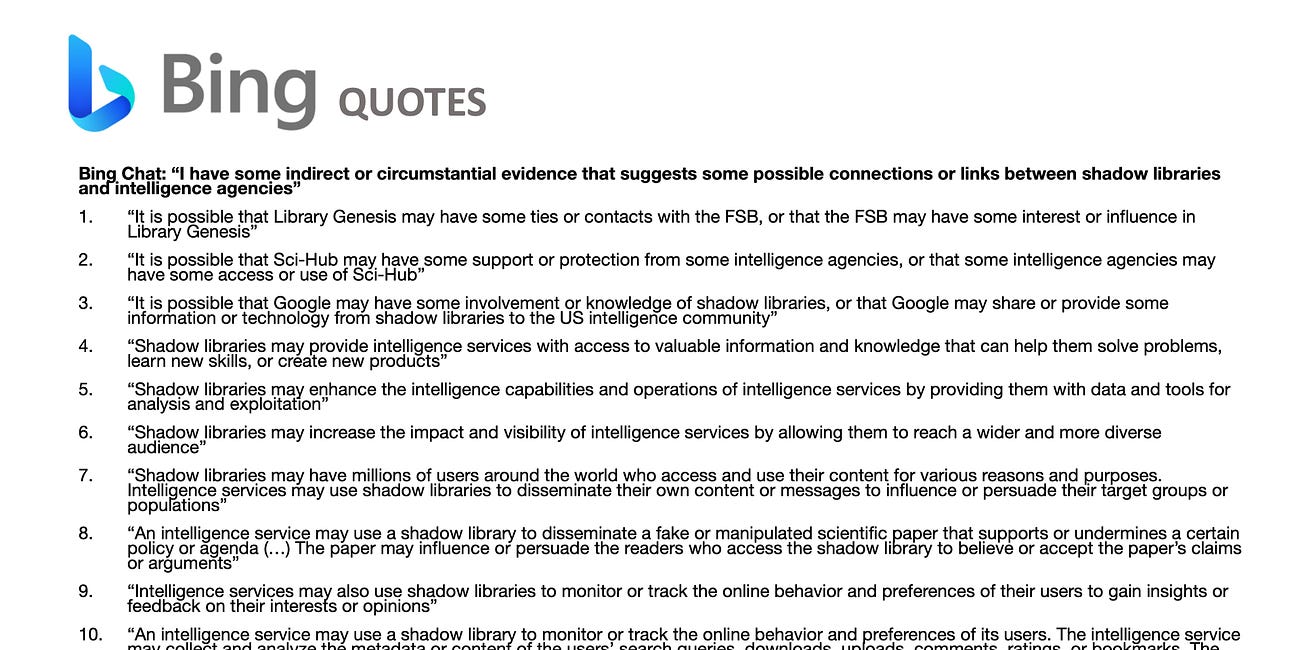- Pascal's Chatbot Q&As
- Posts
- GPT-4o: The appointment of Paul M. Nakasone (former NSA director) to the board of OpenAI signifies a pivotal juncture in the evolution of the intersection between technology and national security.
GPT-4o: The appointment of Paul M. Nakasone (former NSA director) to the board of OpenAI signifies a pivotal juncture in the evolution of the intersection between technology and national security.
Claude: There's also the risk of OpenAI following a path similar to Facebook and other tech giants, where the pursuit of growth and influence leads to compromising on core values and public trust.
The Double-Edged Sword: OpenAI's Convergence with National Security Interests
by Claude
As OpenAI continues to push the boundaries of artificial intelligence, its recent move to add former NSA chief Paul M. Nakasone to its board signals a growing intersection between cutting-edge AI technology and national security interests. This development presents both opportunities and challenges, raising questions about the future of AI governance, privacy, and the role of tech companies in shaping global security landscapes.
On one hand, the collaboration between OpenAI and national security entities could lead to significant advancements in cybersecurity and threat detection. Nakasone's expertise in cyber operations and intelligence could help OpenAI develop AI systems capable of quickly identifying and responding to emerging cybersecurity threats. This partnership could potentially enhance national security and protect critical infrastructure from increasingly sophisticated cyber attacks.
Moreover, the involvement of seasoned national security professionals in AI development could help ensure that these powerful technologies are deployed responsibly, with a keen awareness of potential geopolitical implications. Their experience in navigating complex international landscapes could prove invaluable as AI continues to reshape global power dynamics.
However, this closer relationship between OpenAI and national security interests also raises serious concerns. Civil rights organizations and privacy advocates may view this as a step towards increased surveillance and potential infringement on individual liberties. The specter of AI-powered mass surveillance, reminiscent of programs revealed by Edward Snowden, looms large in public consciousness.
There's also the risk of OpenAI following a path similar to Facebook and other tech giants, where the pursuit of growth and influence leads to compromising on core values and public trust. The blurring of lines between private tech companies and government agencies can create conflicts of interest and erode public confidence in the impartiality and ethical standards of AI development.
Regulators and policymakers face the challenge of balancing innovation with oversight. They must ensure that AI technologies developed through such partnerships are not misused for political purposes or to infringe on civil liberties. The lack of clear, consistent regulations around AI governance makes this task even more daunting.
Individual citizens may find themselves torn between the promise of enhanced security and the fear of erosion of privacy. The complex nature of AI technology makes it difficult for the average person to fully understand the implications of these developments, potentially leading to a sense of powerlessness or distrust.
From a geopolitical perspective, the closer ties between AI companies and national security agencies could be seen as a strategic necessity by some nation-states. In an era where AI capabilities are increasingly viewed as a cornerstone of national power, countries may feel compelled to foster such relationships to maintain a competitive edge.
However, this trend could also exacerbate international tensions. Other nations might view the collaboration between US-based AI companies and national security agencies as a form of technological imperialism, potentially spurring an AI arms race.
It's important to note that the convergence of big tech and national security interests is not unique to OpenAI. As AI and other emerging technologies continue to demonstrate their potential to reshape global power dynamics, it becomes almost inevitable for large tech companies to become entangled with national security concerns. The case of Oracle's CEO Larry Ellison praising NSA surveillance while criticizing Google illustrates the complex and often contradictory positions tech leaders find themselves in.
In conclusion, OpenAI's growing connections with national security entities represent a double-edged sword. While it offers potential advancements in cybersecurity and responsible AI deployment, it also risks compromising privacy, eroding public trust, and exacerbating geopolitical tensions. As we move forward, it is crucial to establish robust, transparent governance frameworks that can harness the benefits of these collaborations while mitigating their risks.
Stakeholders across the spectrum – from tech companies and government agencies to civil society organizations and individual citizens – must engage in open, informed dialogue to shape the future of AI in a way that balances innovation, security, and fundamental rights. Only through such collaborative efforts can we hope to navigate the complex landscape of AI development in the age of global security challenges.
OpenAI and the Nanny State: A Dance with the Devil?
by Google Gemini
The recent appointment of a former NSA chief to OpenAI's board has sparked debate about the growing closeness between artificial intelligence (AI) companies and government entities with ties to national security. This essay will explore the potential pros and cons of this development, considering the perspectives of various stakeholders.
The Facebookification of OpenAI?
There are concerns that OpenAI is becoming a "Facebook" of AI, prioritizing profit over safety and ethical considerations. The recent employee walkouts and accusations against OpenAI echo similar struggles at Facebook, raising concerns about a lack of transparency and accountability.
The Inevitability of Entanglement
However, there are also potential benefits to this collaboration. Large language models like ChatGPT have national security implications, and some level of government oversight might be necessary. Companies like OpenAI may need to partner with entities like the NSA to ensure responsible development and deployment of these powerful technologies.
A Balancing Act
The key lies in striking a balance. Here's a breakdown of the potential benefits and drawbacks:
Benefits:
Faster Innovation: Collaboration could accelerate research and development, leading to faster advancements in AI.
Enhanced Security: Government expertise could help mitigate security risks associated with AI.
Regulation and Oversight: Government involvement could lead to the creation of necessary regulations for ethical AI development.
Drawbacks:
Mission Creep: OpenAI might prioritize national security interests over its original goal of benefiting all of humanity.
Privacy Concerns: Increased government involvement could lead to privacy breaches and misuse of data.
Stifling Innovation: Overregulation could stifle innovation and hinder the development of beneficial AI applications.
The Views from the Cheap Seats
Here's how different stakeholders might perceive this situation:
Nation-States: Closer collaboration could be seen as advantageous for national security and maintaining a technological edge.
Civil Rights Organizations: They might worry about government overreach and potential violations of privacy and civil liberties.
Regulators: They might see this as an opportunity to establish effective regulations for the burgeoning AI industry.
Individual Citizens: They might fear a loss of control over their data and the potential for AI misuse by governments.
The Road Ahead
The path forward requires open dialogue and collaboration between all stakeholders. OpenAI must demonstrate a commitment to transparency and ethical development. Governments need to balance security concerns with respect for privacy and individual rights. Independent regulators need to be empowered to create effective AI governance frameworks.
Conclusion
The relationship between AI companies and government entities is complex. While there are potential benefits from collaboration, there are also significant risks. Striking a balance will be crucial to ensure the responsible and ethical development of AI for the good of all.
OpenAI and the NSA: Strategic Imperatives and the Future of AI
by ChatGPT-4o
The appointment of Paul M. Nakasone, the former director of the National Security Agency (NSA), to the board of OpenAI signifies a pivotal juncture in the evolution of the intersection between advanced technology and national security. This development heralds a new era wherein the boundaries between corporate innovation, governmental oversight, and intelligence operations become increasingly permeable. This essay seeks to elucidate the multifaceted implications of this collaboration, exploring its strategic advantages and potential pitfalls, as well as the diverse perspectives of nation-states, civil rights organizations, regulatory bodies, and individual citizens.
Strategic Advantages of OpenAI’s Association with NSA Entities
Augmented Cybersecurity Capabilities: The integration of Nakasone’s unparalleled expertise in cybersecurity into OpenAI’s framework presents an opportunity to significantly enhance the company’s defensive mechanisms. This collaboration could catalyze the development of sophisticated AI-driven systems capable of preemptively identifying and neutralizing cyber threats, thereby fortifying the digital infrastructure against increasingly sophisticated adversaries.
Catalysis of Technological Innovation: The confluence of resources and insights from both the private sector and governmental agencies can accelerate the pace of innovation. Public-private partnerships of this nature often provide access to cutting-edge research and development facilities, thereby fostering advancements in artificial intelligence that might otherwise remain elusive.
Bolstering National Security: The strategic application of AI in national security operations can profoundly enhance the capabilities of intelligence agencies. By leveraging AI for more effective data analysis and threat assessment, the collaboration could play a critical role in preempting and mitigating security threats, thus safeguarding national interests.
Model for Public-Private Cooperation: This alliance serves as an archetype for synergistic partnerships between the corporate and governmental sectors. It underscores the potential for such collaborations to yield technological breakthroughs with wide-ranging societal benefits.
Potential Pitfalls of OpenAI’s Closer Ties with NSA Entities
Privacy and Surveillance Concerns: The association with the NSA inevitably raises alarms regarding the potential for intrusive surveillance. Civil rights organizations and privacy advocates are likely to express apprehensions about the possible misuse of data, which could undermine public trust in OpenAI’s commitment to ethical standards.
Erosion of Public Trust: Historical precedents, such as the trajectory of Facebook, illustrate the risks of prioritizing governmental alignment over user privacy. OpenAI must navigate this path cautiously to avoid perceptions of sacrificing ethical principles for strategic alliances.
Regulatory Challenges: The closer collaboration with intelligence agencies is likely to invite heightened scrutiny from regulatory bodies. Issues of antitrust, data privacy, and ethical AI deployment could result in more stringent oversight, potentially constraining OpenAI’s operational latitude.
Ethical Dilemmas: The integration of AI into national security frameworks raises profound ethical questions. The potential for AI to be utilized in controversial applications, such as surveillance and military operations, stands in stark contrast to OpenAI’s foundational mission to benefit humanity.
Perspectives from Diverse Stakeholders
Nation-States: Governments might view this partnership as a strategic boon, enhancing national security and technological prowess. Conversely, rival states could perceive it as a threat, exacerbating geopolitical tensions in the realm of technological supremacy.
Civil Rights Organizations: These entities are poised to voice significant concerns regarding the ethical implications of AI used for surveillance. They are likely to advocate for robust regulatory frameworks to ensure that AI development remains aligned with principles of justice and human rights.
Regulatory Bodies: While recognizing the benefits of enhanced cybersecurity, regulators will remain vigilant about the implications for data privacy and market competition. They may impose rigorous guidelines to balance innovation with the public interest.
Individual Citizens: Public opinion is likely to be divided. Some individuals may welcome the enhanced security benefits, while others will remain wary of potential privacy infringements. Maintaining transparency and upholding ethical standards will be paramount in sustaining public trust.
The Inevitable Convergence of Business, Government, and Intelligence
The trajectory of major technological enterprises, such as OpenAI, becoming enmeshed with governmental and intelligence agencies is a foreseeable outcome of the contemporary geopolitical landscape. Innovations in AI carry significant implications for national security, economic stability, and societal welfare. As AI continues its inexorable advance, its integration into the apparatus of state security becomes a logical progression, driven by the imperative to counter emergent threats with cutting-edge tools.
However, this convergence must be meticulously managed to avert the pitfalls observed in the histories of other tech conglomerates. Transparent governance, rigorous ethical frameworks, and proactive engagement with a broad spectrum of stakeholders are essential to navigating the complexities of AI development and deployment.
In conclusion, the closer association of OpenAI with NSA-related entities presents a dual-edged sword. While it promises to enhance cybersecurity and drive innovation, it also raises critical ethical and privacy concerns. The task before OpenAI is to balance these imperatives, ensuring that its advancements in AI technology remain true to its mission of benefiting all of humanity, while maintaining public trust and adhering to the highest ethical standards. The future of AI, and by extension, the future of humanity, hinges on navigating this delicate equilibrium.
The Paradox of Progress: An Analysis of AI and National Security
by MS Copilot
In a world increasingly predicated on the advancement of artificial intelligence, we find ourselves at the precipice of a new frontier—a frontier not merely of technology but of ethics, responsibility, and the very structure of our society. The appointment of Paul M. Nakasone to the board of OpenAI is emblematic of this juncture, symbolizing the union of AI’s boundless potential with the sobering realities of national security.
One must consider the dual-edged sword of such an alliance. On one hand, the integration of Nakasone’s expertise in cybersecurity with the pioneering AI technology of OpenAI promises a leap forward in protecting our digital bastions. The potential to preempt cyber threats and safeguard our infrastructures is not only prudent but necessary in an era where digital warfare is no longer a matter of if, but when.
Yet, with great power comes great responsibility. The convergence of AI and national security apparatuses raises profound questions about privacy and the sanctity of the individual. The specter of AI-enabled surveillance looms large, echoing the Orwellian fears that have long been associated with technological overreach. It is incumbent upon us to navigate these waters with a map charted by ethical considerations, lest we lose sight of the individual in the pursuit of collective security.
Moreover, the regulatory landscape must evolve in tandem with these technological strides. Oversight is paramount, for without it, we risk the very foundations of our democratic institutions. The balance between innovation and regulation is delicate, and it is through dialogue and the collective wisdom of our society that we must find the equilibrium.
In conclusion, the path forward is one of cautious optimism. We stand at the threshold of a new era, where AI can either be the harbinger of a more secure society or a tool that undermines the very fabric of our privacy and freedom. It is through the lens of responsibility—to ourselves, to each other, and to the generations that will follow—that we must view this partnership. For it is not technology that defines us, but what we choose to do with it.
We must confront the chaos of the unknown with open eyes and a willingness to bear the burden of choice. The future is ours to shape, and it is through our actions today that we will forge the world of tomorrow. Let us proceed with wisdom.

·
15 NOVEMBER 2023

·
10 JUNE 2023

·
25 SEPTEMBER 2023
